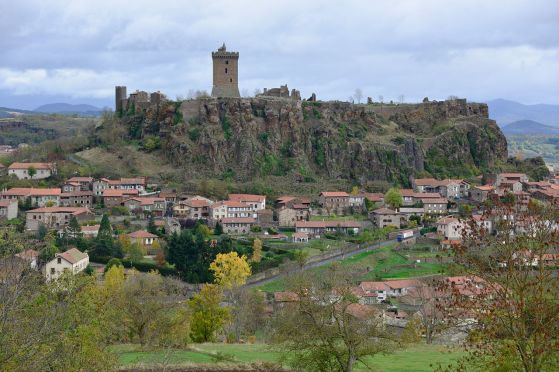The reign of King Ralph is not a good time for private charters. I don’t know why this should be – with the usual exception (Cluny), a drop-off in the number of private charters from the 920s and 930s is a kingdom-wide phenomenon. What this means is that we’re dealing this week with an undated charter, albeit one that has a fairly narrow range of possible dates (c. 930-935, and my guess is on the earlier side). We’ve already seen in previous weeks how Ralph of Burgundy established his personal hegemony over large chunks of Guillelmid Aquitaine after the death of Duke Acfred – but what were the members of the old Guillelmid network doing?
Cart. Brioude 28 (5th June, c. 930, Polignac)
To the sacrosanct church of God and the martyr St Julian in the village of Brioude, in which that holy martyr of God rests with other saints, in which place Dalmatius [I of Brioude], by God’s grace viscount, is seen to preside as ruler, in the time of Prior Cunebert and Dean Hector administering its cares.
Therefore we, in Christ’s name Bishop Godeschalk [of Le Puy], Bishop Aurelius, Viscount Dalmatius, Suffician, Gerald, Odilo, Heraclius, Desiderius, Rainer, Bernard, the almsmen of William [the Younger, duke of Aquitaine] who is deceased, through a bequest and through his donation and for the absolution of his soul, that the pious Lord, through the intercession of St Julian and all the saints, might deign to give indulgence to his sins, cede to it in the common victuals of its canons his own goods which fell to him as an inheritance from his parents.
These goods are sited in the fatherland of the Auvergne, in the county of Brioude, in the vicariate of Usson, in the estate which is called Pineta. In that estate we cede to God and St Julian two double manses with manses and fields and meadows and woods, cultivated and uncultivated, sought and whatever is to be sought, with two parts; and we cede the whole tithe to God and St Julian to be had and sold, donated or exchanged in common amongst the brothers, such that from this day forth you might have permission to do whatever you wish by your judgement to do with it, without any contradiction.
If any person, though, either my heir wishing to change our mind, or any other person, should exert themselves to disturb the canons of Saint-Julien, in the first place let them incur God’s wrath, and share a place in the inferno with Dathan and Abiron and with Judas the betrayer, who betrayed the Lord, unless they come to their senses and come to make amends, and in addition let them be compelled to pay one pound of pure gold, and let what they seek find no purchase.
This affirmation was made on the third nones of June [5th June], at the castle which is called Polignac, in the reign of Ralph, king of the Franks and the Aquitanians.
Let this charter, written at that time, endure firm for all time, with these witnesses: Bishop Godeschalk, Aurelius, Dalmatius, Suffician, Gerald, Odilo, Heraclius, Desiderius, Rainer, Bernard; all these almsmen of William asked this charter be made, with Antoard hearing and Bernard Antrive.

The impressive-looking fortress of Polignac as it exists today (source)
The first thing to note here is that I don’t know who Bishop Aurelius is. He’s not the bishop of Clermont or the archbishop of Bourges; if I had to guess, I’d say either Nevers or Mende, but probably Mende. ‘Aurelius’ is a name which rings more of the Velay than the Nivernais. It would also fit with the general southern tinge of the assembled people. You wouldn’t necessarily pick this up from William the Pious’ appearances on this blog, but compared generally to the Guillelmid following twenty-odd years earlier, this is very focussed on the Auvergne and its environs – no Berrichons, probably no one from Nevers, nor the Mâconnais. It’s also delivered in a much more southerly location than the Guillelmid dukes themselves can be seen. Polignac is a fortification immediately outside Le Puy. This makes sense in terms of the fact that it’s the bishop of Le Puy issuing the charter, but that fact itself is quite important – why not Bishop Arnald of Clermont, given the importance of Auvergne to William the Pious and his successors?
Intriguingly, after receiving the submission of the Aquitanians in 930, Ralph went to meet them in winter 931 because they were discordantes – squabbling. We have (if one follows Jean-Pierre Brunterc’h’s argument) a diploma issued at Ennezat at this time, whose intercessors are Ebalus Manzer and Viscount Adhemar of Echelles. That’s a pretty wide range of recipients in an Aquitanian context, and it makes one wonder what they were squabbling over. In fact, it was probably precisely the question of where power should reside in the newly overturned region. The men not at the table in late 930 were Counts Ermengaud of Rouergue and Raymond Pons of Toulouse. Ralph’s meeting at Ennezat was likely an intercession to resolve these disputes.
In that light, this donation by this group, five years or so after the death of William the Younger, is likely to be preliminary to the Ennezat meeting. We may be looking at an attempt by a network of allies to remember their roots, reaffirm the reputation of their old lord, and determine where they stand in the new, William-less world. As we’ve seen, this network would eventually end up loosely attached to the power-base of Raymond Pons, but it preserved enough continuity to reactivate as a regional power in its own right under Bishop Stephen of Clermont in the 940s. Acts like this are likely to be an important way this continuity was maintained.
3 thoughts on “Charter A Week 55: The Squabbling Aquitanians”